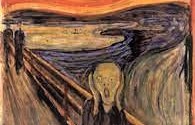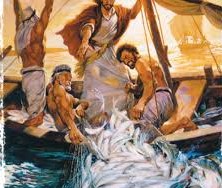
Faith an Antidote to Angst?
Despite its age, many of us can relate to the lyrics of “Calling All Angels” by the American Rock Band, Train, released in 2003.
I need a sign to let me know you’re here. All of those lines are being crossed over the atmosphere. I need to know that things are gonna look up ‘cause I feel us drowning in a sea spilled from a cup.
When there is no place safe and no safe place to put my head. When you feel the world shake from the words that are said.
And I’m calling all angels, and I’m calling all you angels
I need a sign to let me know you’re here ‘cause my TV set just keeps it all from being clear. I want a reason for the way things have to be. I need a hand to help build up some kind of hope inside of me.
This is a pretty good expression of the angst that people in the contemporary world appear to be feeling. As if the effects of the pandemic weren’t enough, many of us now feel saddened and anxious because of an unprovoked, brutal war against Ukraine and the war’s risks for the rest of the world.
Calling All Angels is clear about the angst, but it isn’t clear whether its “angels” refer to the spiritual beings in which many Christians believe, or in an analogical sense, to humans who have the noble attributes of angels.
This Generation Seeks a Sign
As for the song’s wish for “a sign,” Jesus sees that in his time as an indication of faithlessness. Speaking to the crowds, he said, “This generation is an evil generation; it seeks a sign, but no sign shall be given to it except the sign of Jonah.” This references the Old Testament (and Quran) prophet Jonah, who was said to have been in the belly of a big fish for three days, the same number of days that Jesus was in the tomb.
In this case, and in many others in the Christian Bible, Jesus urges faith.
It brings to mind another biblical reference in which Jesus is telling the fictional story of an unnamed rich man and a poor man named Lazarus. The rich man ate sumptuously while Lazarus longed to eat the scraps falling from the rich man’s table. When Lazarus died, he was “carried by the angels to Abraham’s bosom,” or what we call heaven.
The rich man also dies but was in Hades, an evil god in ancient Greek mythology but in this story a place of torment, similar to the modern idea of hell. The rich man asks Abraham to warn his five brothers about the risk of going to Hades after death, saying that “if someone goes to them from the dead, they will repent.”
If They Do Not Hear Moses
But Abraham replied, “If they do not hear Moses and the prophets, neither will they be convinced if someone should rise from the dead,” another obvious reference to Jesus’ future resurrection.
These times are perfect for an answer to the question, “What good is faith?” And my answer is pretty simple. Loving God and neighbor, the first and second most important commitments to faith, help make the difference between an impersonal and cold world and a warm, loving one. People of faith may not always measure up, but our goal, at least, is unselfishness and concern for the common good.
Obviously, we have no exclusivity when it comes to those goals. We share them with many non-believers. But the clincher for people of faith is the “love-of-God” part. A relationship with the creator helps us maintain personal peace of mind in the midst of angst.



